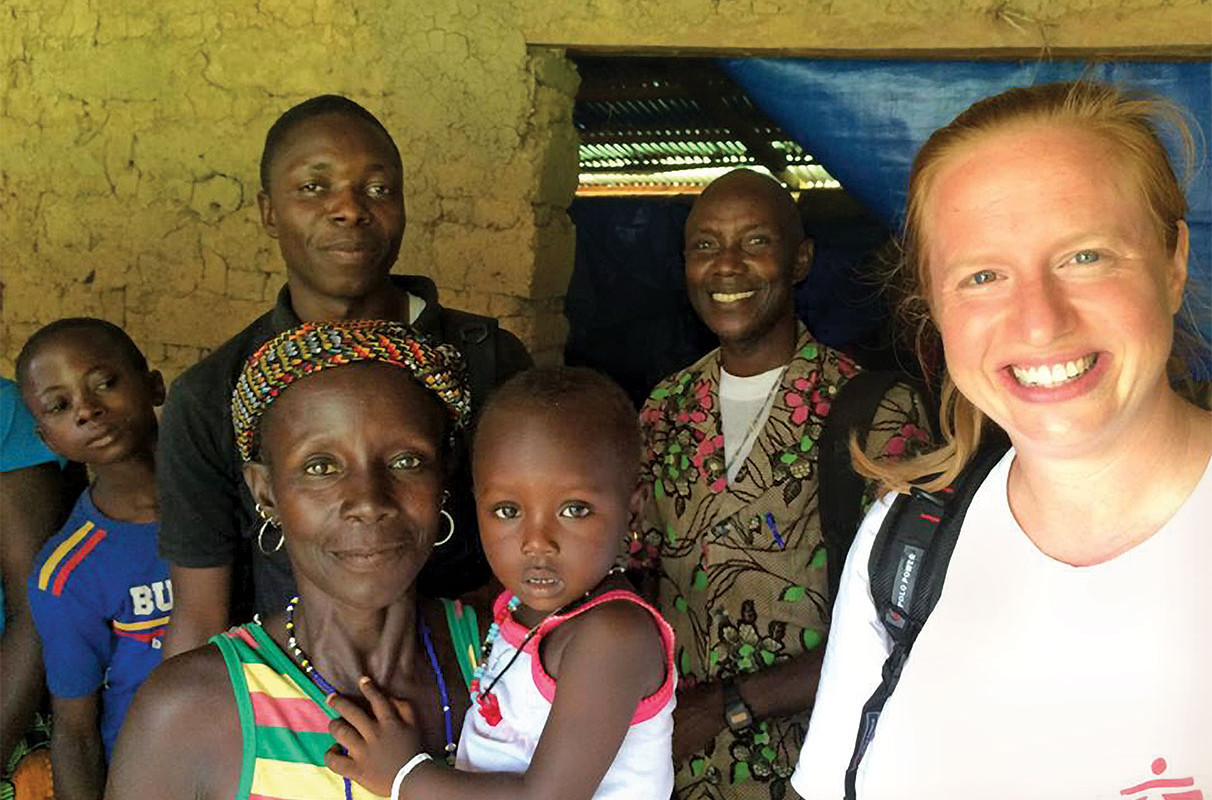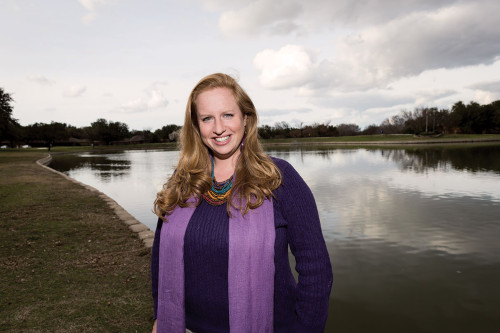
On the Front Lines
International disease detective Rebecca Coulborn tracks the Ebola outbreak in West Africa.
Preventing the 2014 ebola outbreak from expanding into a worldwide disaster required health professionals working on the front lines to isolate the virus. Epidemiologist Rebecca Coulborn ’98 worked in Guinea to help trace the disease’s potential routes of transmission.
The World Health Organization reports that the Ebola epidemic, which is still ongoing at this time, has claimed roughly 10,500 lives out of over 25,000 confirmed cases. But the loss of life could have been much higher. “We don’t live in a singular world,” said Coulborn, who worked for Doctors Without Borders at Ebola’s ground zero. “We live in a world that is extremely globalized.”
After graduating from TCU with a degree in French and biology, Coulborn joined the Peace Corps. She spent two years in Lokosso, in French-speaking Burkina Faso. Her job involved developing campaigns for health promotion and disease prevention, such as vaccinations and sanitation improvements. She created a theater troupe to demonstrate how to avoid HIV infection, and the water purification program she implemented in the village helped eradicate Guinea worm in the area.
After working in the West African nation for two years, Coulborn was no longer the free-spirited young woman who left Texas. “Peace Corps opened my eyes to the incredible lack of access to health and services and resources that are prevalent in most of the rest of the world,” she said. “A small amount of effort can actually make a huge impact in somebody’s life.”
The Peace Corps alumna deliberated on the best way to align further education with her service-focused Christian value system. She decided to pursue epidemiology – the study of disease on a population level. While in Burkina Faso, she saw people die from preventable diseases, such as meningitis and yellow fever. She decided studying epidemics on a broad level could have major impacts in individual lives.

After graduating from TCU with a degree in French and biology, Rebecca Coulborn joined the Peace Corps. She spent two years in Lokosso, in French-speaking Burkina Faso. Courtesy of Rebecca Coulborn
Answering a Call
Coulborn earned a master’s degree at the University of Michigan, and after several years working in the Detroit area, she returned to international service. “That call just got louder and louder,” she said. “I wasn’t able to ignore it any more.”
In 2010, the epidemiologist joined Doctors Without Borders. Coulborn’s first assignment was in Sokoto, Nigeria. She spent a year in the West African nation combating aggressive diseases, including meningitis, measles and cholera.
The next assignment was in Thyolo, Malawi, where in addition to studying transmission patterns of HIV and tuberculosis, Coulborn participated in policy discussions in the southeast African country. During her tenure, the team helped the Malawian government expand HIV treatment access for women. A study published by the Centers for Disease Control and Prevention said the expansion resulted in a 700 percent increase in treatment rates.
During a break at home in Fort Worth, Coulborn learned of the Ebola outbreak in West Africa. In December 2013, the disease’s first casualty was a 2-year-old child in Gueckedou, Guinea. Three months later, Doctors Without Borders opened the first treatment center in the forested district.
The humanitarian organization’s officials pleaded for international support to help fight the viral wildfire brewing in the West African country, but little was forthcoming.
“You have an acute awareness of where your hands were all the time.”
Rebecca Coulborn '98
Needing all available hands, Doctors Without Borders asked former staffers to consider working to subdue the escalating crisis. In particular, the organization needed Francophone epidemiologists to work in French-speaking Guinea. Coulborn’s specific set of skills was ideal for the mission.
Ebola has no cure. The only hope for stopping the disease relies on identifying people at risk for developing it and isolating them before they become contagious. Epidemiologists specialize in this kind of investigative process.
Coulborn joined the Gueckedou team, arriving in the hot zone in mid-September. The mission was a “chance to make a big difference and hopefully save thousands of lives,” she said.
Treatment center staffers were “hyper-vigilant” about protecting themselves, Coulborn said. “You have an acute awareness of where your hands were all the time.”
Working at the Ebola outbreak’s ground zero was “kind of surreal,” she said. “You’re in this incredibly beautiful place with remarkable trees and grass and flowers and birds. Then there’s this huge mass of tents and a pit where they burn all the waste.”
By last fall, the disease had spread throughout Guinea and into neighboring Liberia and Sierra Leone. At the height of the epidemic, the Gueckedou center admitted 60 to 100 new Ebola patients each week.
On an average day, Coulborn worked about 14 hours and logged five to 12 deaths. Despite the grueling schedule, “we always felt a bit behind,” she said.
Hunt for a Viral Killer
Serving as the treatment center’s epidemiologist, Coulborn merged intake data, such as geographic origin, likely contacts and travel history, with laboratory results. She worked with a cartographer who plotted cases on a geographic information system to draw a map of the disease as it spread through human hosts.

Rebecca Coulborn worked with a cartographer who plotted cases on a geographic information system to draw a map of the disease as it spread through human hosts. Photo by Vishal Motra
As soon as doctors diagnosed a new patient with Ebola, Coulborn sent a national staff member to the patient’s home area. There, the contact tracer coordinated with a community liaison to monitor people exposed to the infected person.
“It’s a race to identify the contacts and to educate,” the epidemiologist said. “It usually takes one to three days from the onset of fever for you to have enough virus replication to transmit Ebola.”
Before leaving Gueckedou in November, Coulborn visited the treatment center’s cemetery. Unmarked mounds of dirt spread out in every direction, including graves spilling down a hillside. “We began to run out of space,” she said. “And very few of those graves were even marked.”
At the beginning of the year, Coulborn returned to Guinea for a Doctors Without Borders coordination role in the country’s capitol, Conakry. She represented epidemiologists across the country on a Guinean Ebola task force in January and February. She also monitored Ebola reports and led discussions about “where we needed to send in teams to explore and assess the situation.”
Many Guinean schoolchildren returned to classrooms in February, and daily life continues for the survivors. But with only about 14 percent of new Ebola cases in Guinea traced to known contacts, the mysterious pathways of the deadly contagion remain.
“One case of Ebola is enough for another peak to start again,” Coulborn said. “Getting to zero is going to be exceptionally challenging.” Some health treatment trials have been promising, but a cure remains elusive, and the health danger is still real.

Your comments are welcome
Comments
Related Reading:
Alumni
G. Malcolm Louden, 1945-2024
The longtime Trustee embodied the title bestowed upon him as an undergraduate: “Mr. TCU.”
Alumni, Features
To Be Fair
FTC lawyer Katherine Van Dyck ’01 has Americans’ back.